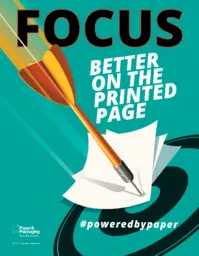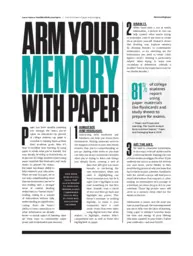
Paper has deeper ability to help entrench your education. When we read on paper, we’re not only comprehending more than we do via screen, but we’re also reading with a stronger sense of context. Reading online leads to “tunnel vision” reading, taking in a snippet of information without fully understanding its significance, cutting short the brain’s ability to form connections to other information we already know—a crucial aspect of learning. Here are three ways to commandeer paper power and revolutionize your memory:
1. Annotate and highlight.
Interacting with textbooks and handouts can help you retain their information. Writing summary notes in the margins of books in your own words ensures that you’re comprehending as you go. Making other notes as you read can help you draw connections between what you’re trying to learn and things you already know, creating a web of data that will give you more inroads to retrieving the new information when you need it. Highlighting can boost retention too, but do it right: Don’t highlight as you read something for the first time. Instead, read a chunk of text and then go back and highlight key points. This doesn’t translate to reading digitally, so paper is your compatriot here.
2. Draw it.
When faced with a sea of wordy information, a picture or two can help cement what you’re trying to remember, even if you have to create those pictures yourself. Research shows that drawing may improve memory by allowing learners to contextualize information, so try sketching out the information you need to retain (stick figures count!). Drawing is particularly helpful when trying to learn new vocabulary or definitions. (Already a doodler? Check out our doodle decoder.)
3. Get the gist.
We tend to remember information in two ways: in broad strokes and in contextual details. Tapping into one of these modes can trigger the other: If you suddenly run across a random bit of trivia you once knew, you’re likelier to then recall the big picture of why you knew that fact in the first place. Likewise, familiarity with the overall concept will lead you to recall information that supports it. After reading an information-rich passage in a textbook, jot down the gist of it in your notebook. Those big-picture notes will serve as a memory cheat sheet for the details in the text.
Information is power, and the more you have at your disposal, the more empowered you are to fully own the labor of learning. Using paper to enhance retention keeps the time and energy of your lifelong education squarely in your hands. Gather your notebooks—and march forth.
Looking to learn something new? Take a look at these printables.






